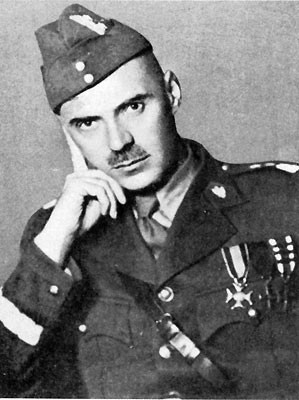
Władysław Albert Anders was a general in the Polish Army and later in life a politician and prominent member of the Polish government-in-exile in London.

Zygmunt Henryk Berling was a Polish general and politician. He fought for the independence of Poland in the early 20th century. Berling was a co-founder and commander of the First Polish Army, which fought on the Eastern Front of World War II.

Tadeusz Kutrzeba was a general of the army during the Second Polish Republic. He served as a major general in the Polish Army in overall command of Army Poznań during the 1939 German Invasion of Poland.
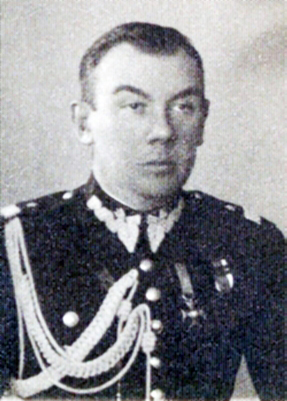
Juliusz Zulauf was a Polish Army brigadier general. A recipient of the Virtuti Militari, he fought with distinction during World War I, the Polish-Ukrainian War, the Polish-Soviet War, and the 1939 invasion of Poland.
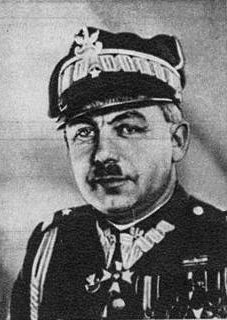
Gen.bryg. Edmund Stanisław Knoll-Kownacki (1891–1953) was a Polish military officer and a high-ranking commander of the Polish Army.

Juliusz Karol Wilhelm Józef Rómmel was a Polish military commander, a general of the Polish Armed Forces.

Count Tadeusz Jordan-Rozwadowski was a Polish military commander, diplomat, and politician, a general of the Austro-Hungarian Army and then the Polish Army.

The War Order of Virtuti Militari is Poland's highest military decoration for heroism and courage in the face of the enemy at war. It was created in 1792 by Polish King Stanislaus II Augustus and is the oldest military decoration in the world still in use.
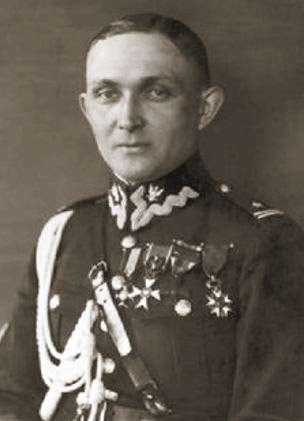
Marian Paweł Porwit was a Polish military officer, a colonel of the Polish Army and a military historian. A commander of one of the sections of the Polish front during the Siege of Warsaw of 1939, after the war he became a historian known for documenting the Invasion of Poland.

Jan Edward Romer was a Polish general and military commander. Studied in Mödling and joined the Austro-Hungarian Army. During the First World War fought at the battle of Limanowa (1914) and battle of Gorlice (1914), was wounded twice. Later he joined the newly recreated Polish Army. During Polish-Ukrainian War he fought in the liberation of Lwów. In Polish-Soviet War, commanded the Cavalry Division at the Battle of Koziatyn, one of the most spectacular raids of the Polish cavalry, during the Polish advance towards Kiev. His troops fought against the Soviet cavalry elite Konarmia of Semyon Budyonny. He commanded the Polish 13th Infantry Division during the Battle of Komarów. Respected by Józef Piłsudski, he was among the first group military personas who confirmed the decoration of Virtuti Militari, highest Polish military decoration, restored after the recreation of the Second Polish Republic, and he himself received the Commander's Cross of that award. Held position of Inspector of the Army after the war. Buried in Powązki Cemetery in Warsaw.

Józef Ludwik Zając (1891–1963) was a Polish general and pilot.

Tadeusz Ludwik Piskor (1889–1951) was a Polish Army general.

Leon Berbecki was a Polish army officer, who fought in the Russo-Japanese War and World War I with the Imperial Russian Army. Following the foundation of the Second Polish Republic, Berbecki served in the Polish Army.

Józef Rudolf Kustroń was a brigadier general of the Polish Army in the Second Polish Republic, commandant of the 21st Mountain Infantry Division. He was the first Polish general to die during the German invasion of Poland, and the second general officer casualty of the campaign overall; the first was Wilhelm Fritz von Roettig.

Karol Anders was a Colonel in the cavalry of the Polish Army, brother of Lt. General Władysław Anders and Colonel Tadeusz Anders, and double recipient of Poland's Virtuti Militari – IV and V Class.
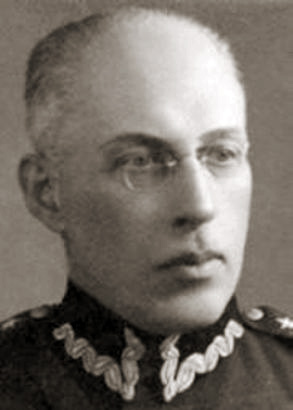
Adam Józef Aleksander Epler was a Colonel of Artillery of the Polish Army, posthumously promoted to Generał brygady. Epler had a wife Zofia and son Zbigniew.
Jan Zygmunt Emil Berek (1896–1986) was a soldier of the Austro-Hungarian Army and Generał brygady of the Polish Army, who fought in World War I, Polish–Soviet War and the Invasion of Poland.

Józef Werobej was a Polish infantry officer who served in the Imperial Russian Army and a colonel in the Polish Army appointed by the Polish authorities in exile as a brigadier general. Knight of the Order of Virtuti Militari.

Julian Filipowicz was a major general of the Polish Armed Forces and a commander of the Home Army in the Kraków-Silesia Area. He was also a commander of the Service for Poland's Victory in the Kraków area and inspector of the main headquarters of the Union of Armed Struggle and Home Army.

Ottokar Wincenty Brzoza-Brzezina was a Polish brigadier general of Czech origin who was notable for his service in the Battle of Krzywopłoty during the First World War.
This page is based on this
Wikipedia article Text is available under the
CC BY-SA 4.0 license; additional terms may apply.
Images, videos and audio are available under their respective licenses.



















